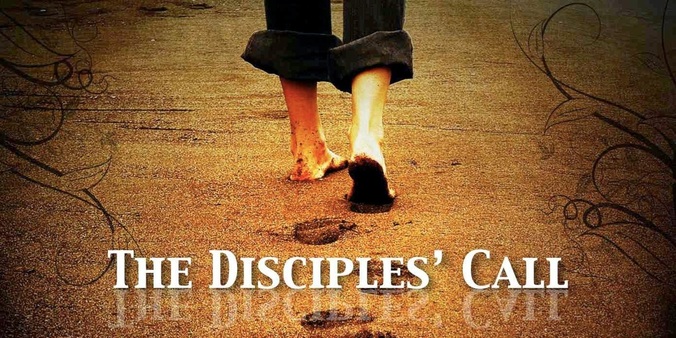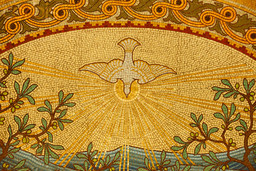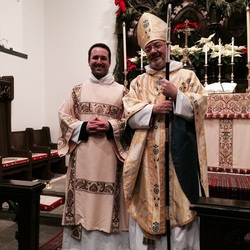 You’ll remember that we talked about two call stories last week, one of the boy Samuel and another of Philip and Nathanael. This week, the momentum builds and Jesus calls four new followers to share in his mission: Simon and Andrew first, and then James and John. A perfect Gospel for annual meeting Sunday, because it tells us what we are to be about as Jesus’ followers, and hints at what can get in the way of our central purpose. I usually give my rector’s address on annual meeting Sunday in the form of a sermon: first because we all know not everyone stays for the meeting, and second because it reminds both you and me to listen to the Bible first as we think about our parish life, which is better than acting as if your role is just to listen to me, especially since part of my role is actually to listen to you – and, of course, to the Bible at the same time. I’m not here as a chaplain to a club or as a CEO of a nonprofit organization, and I don’t think many of you want me to pretend as if those kinds of things were what you called me to Emmanuel to be. I think you wanted to call a priest, and that’s what I am, so here we are.
0 Comments
A sermon preached by the Rev. Cameron Nations on the Second Sunday of Christmas With my ordination now immediately behind me, and the end of seminary looming immediately in front of me, I’ve found myself growing rather reflective in the midst of this—as Bishop Martins put it in his sermon the other night— particularly liminal moment. I’ve found myself thinking a great deal about journeys—specifically, spiritual journeys. We all possess a story of our spiritual journey. Whether that journey takes you into a community of faith like this one or takes you far from any religious belief at all, everyone has a journey of some spiritual dimension. For instance, I remember feeling called at seventeen to give my life in service to the Church—a call I took at that time to mean a life as a Southern Baptist preacher. I remember, too, getting ready after my freshman year of college to transfer from Belmont University in my hometown of Nashville to the University of Illinois. I remember having fallen away from my faith, having lost my sense of vocation. I remember wanting desperately to find my way back to God. And I remember, too, one summer day just before leaving Nashville to begin my new life in the Midwest—a day that in hindsight feels rather significant, even somewhat prophetic. ...  Not knowing when I would return to my hometown, Carly and I drove all around Nashville taking pictures of places that I wanted to remember. One of those places was a beautiful neo-Gothic church that I had admired for years, ever since I was a little boy craning my neck in the backseat of the car to catch a glimpse of the rose window, the bell-tower, the ivy-covered stone. I had never been inside, but I had always imagined what it must look like, what it must be like to worship in that space. A woman saw me snapping a few photographs in the parking lot and invited Carly and I to come and see the inside of the church, and we happily took her up on her offer. The church interior was just as glorious as I had imagined — a soaring ceiling of ribbed wooden vaulting stained dark and rich with age, an ornate high altar over a dozen feet high positioned beneath three spear-shaped windows that shot toward the sky, and a pulpit guarded by carved figures standing sentry along the pulpit’s front. I took pictures of everything — the glimmering organ, the rose window, the baptismal font, the altar frontal… everything. I was absolutely entranced by the space. That church was —is— Christ Church Cathedral in Nashville, and I had absolutely no inkling whatsoever that in less than five years from that summer day I would be serving that congregation and preaching from that very pulpit as an ordinand in the Episcopal Church completing his Field Education. In all honesty, I didn’t even know what the word “Episcopal” meant back then, let alone did I have the slightest idea of joining the church, and certainly no idea of being ordained as a minister in it. Yet spiritual journeys are filled with twists and turns like these, aren’t they? Moments that at times don’t make sense or even seem remotely important suddenly gain significance by the shades and colors of our stories, our vocations. Perhaps that is why I found myself relating so much to the figure of Mary in today’s Gospel reading. Just to recap, we find in today’s Gospel the only story of Jesus’s adolescence in the entirety of the canonical Gospels. Mary and Joseph had traveled with Jesus to Jerusalem for Passover—a common practice for Jews at the time—and then they get ready to leave. But perhaps in a scene reminiscent of that venerable piece of 1990s cinema Home Alone, Jesus’s ticket to Nazareth falls into the trash, he gets put in the attic, everyone sleeps through their alarm, and (frantic) that their camel caravan will head out without them, they end up leaving without Jesus, assuming that he is with other members of the family. Jesus instead remained in Jerusalem, hanging around the Temple to listen to the teachers and ask them questions. And though in Luke’s account Jesus doesn’t seem too worried or bothered about being left behind, one can imagine that Mary did not feel so at ease as Jesus did. I can see her, sort of like Catherine O’Hara trying to get home to little Macaulay Culkin (OK, maybe not totally like that), frantically searching for her son. The text tells us that it was “after three days” that they found Jesus. All Home Alone jokes aside, this must have been truly terrifying for Mary and Joseph. Imagine having lost your child, and then not being able to find that child for three whole days. Yet what fascinates me in particular about this story is Mary’s reaction to Jesus’s explanation of his absence. Jesus says, “Why were you searching for me? Did you not know that I must be in my Father’s house?” And the text tells us this: “50But they [Mary and Joseph] did not understand what he said to them. 51Then he went down with them and came to Nazareth, and was obedient to them. His mother treasured all these things in her heart.” Now it’s odd, don’t you think, that Mary would not understand what Jesus is talking about? After all, in chapter one when the angel Gabriel comes down and announces that Mary will bear a son, he also tells her that Jesus is in fact the Son of God. So how is it that Mary doesn’t understand Jesus when he says he must be in “his father’s house?” How does she fail to make the connection? And what does it mean that she “treasured all these things in her heart?” What is she treasuring? Today’s Gospel passage isn’t the only one that uses that phrase (Mary treasuring something in her heart). Earlier on in chapter 2, Luke says that when the shepherds visited the manger where the infant Jesus lay, they made known what had been told them about this child; 18 and all who heard it were amazed at what the shepherds told them. 19 But Mary treasured all these words and pondered them in her heart. The shepherds relayed the message the angels had given them—the message that Jesus was the Messiah. In fact, multiple figures (such as Simeon) relay this message before we reach today’s passage. Yet it seems that even Mary—Mary, the God-bearer herself—grew distant from her vocation announced to her by Gabriel and affirmed by others. Who knows how many twists and turns occupied those intervening years between the Annunciation and Jesus getting left behind in Jerusalem, how much in the ordinary rhythms of life did the mystery and majesty of the vocation laid before Mary and Joseph get lost. For while these events appear close together in the text, for Mary and Joseph they took place a dozen years apart. A dozen years is plenty of time for things to grow distant and dim. Thus this is what I imagine Mary treasured in her heart: being called back to the sacredness of her vocation as God-bearer. Of course, I believe we all have sacred vocations (just like I believe we all have spiritual journeys). We all have things that God has created us to do; we all possess a love that God has told us to bear into the world. But I also know just how easy it is to lose touch with that vocation, to that love. For instance, I know that today I feel my vocation with great intensity. I have just been ordained, the glow of the Holy Spirit still hasn’t worn off (I hope), the exhilaration of it all is still carrying me through. But I wonder how I will feel in a few months, when I’m still waiting to finalize plans for my first cure and the semester just keeps dragging on and I feel stuck in limbo as we make moving plans and the novelty of the collars have worn off and I have exams to take and papers to finish and… …you get the idea. It’s at that time that I hope I can remember the words of the Veni Creator Spiritus--the ancient hymn sung in the ordination rite that invokes the presence of the Holy Spirit at the Consecration, just before the laying on of hands by the bishop. The words go like this: VENI CREATOR SPIRITUS Come, Holy Ghost, our souls inspire, and lighten with celestial fire. Thou the anointing Spirit art, who dost thy sevenfold gifts impart. Thy blessed unction from above is comfort, life, and fire of love. Enable with perpetual light the dullness of our blinded sight. Anoint and cheer our soiled face with the abundance of thy grace. Keep far from foes, give peace at home: where thou art guide, no ill can come. Teach us to know the Father, Son, and thee, of both, to be but One, that through the ages all along, this may be our endless song: Praise to thy eternal merit, Father, Son, and Holy Spirit. The singing of this hymn is a moment of epiclesis—a fancy word for the moment when one invokes the Holy Spirit. Moments of epiclesis are often accompanied by moments of anamnesis—a fancy word that just means a kind of deep remembering. Both of these are parts of the Eucharistic liturgy in which we participate every Sunday. The epiclesis is when the Holy Spirit is called upon to be present in the gifts of bread and wine. The anamnesis is the part of the liturgy where we recall the Last Supper and the Paschal mystery, remembering and recalling that original Eucharist. Thus it is my prayer that we may recall often the words of the Veni Creator, that we allow ourselves to be inspired by the celestial fire of the Holy Spirit, and that our encounter of Christ in the Eucharist every week may trigger our remembering of our vocations so that we, like Mary, may treasure these reminders in our own hearts as we go forth into the world proclaiming and bearing God’s love to all.  A sermon preached by the Rt. Rev. Daniel Martins It’s a true joy, as always, to be at Emmanuel, and especially at this time of year, when everything is done up so beautifully. But it is particularly energizing to be present at an event like an ordination—a liminal time, a pivotal moment, a chronological hinge in the life of Cameron Nations, and also, although perhaps not quite so visibly, a real moment of transition in the life of the One Holy Catholic and Apostolic church scattered throughout the world. So it’s a time of excitement and joy and, I would imagine, some measure of relief—though I would be remiss to completely omit any mention of the specter of the General Ordination Exams that lurks outside in the parking lot somewhere, not quite welcome here in the church! But it would also be remiss of me to completely omit any mention of the fact that there’s a certain, shall we say, structural ambiguity about exactly what we’re doing tonight. The program says that we’re ordaining a deacon, and we are, in fact, using the liturgy prescribed by the Episcopal Church for the ordination of deacons. And, precisely because that’s what we’re doing, we are, at one level, about to make a liar out of Cameron, because we’re going to ask him if he believes himself called to the life and work of a deacon, and he’s going to going to try not to cross his fingers as he responds that he indeed does believe himself to be so called. And there will be something incoherent about that because, in about six months, the plan is that we’ll make him a priest. Now, I’m not going to get into the whole arcane theological debate about whether deacons who become priests are still deacons, because, however you settle that argument, the “life and work of a deacon” is pretty distinct from the “life and work of a priest,” and Cameron has spent that last two-and-half-years being formed for the latter, not the former. |
Archives
July 2024
Categories |

 RSS Feed
RSS Feed